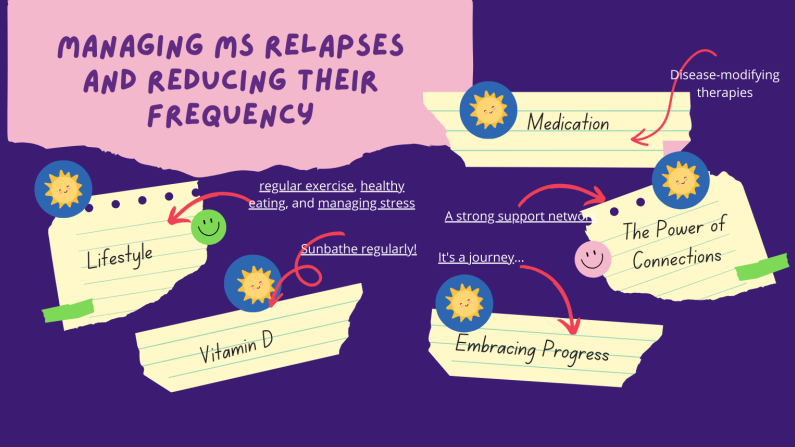In this post, I’ll delve into the intricate realm of relapses and their management within the context of Multiple Sclerosis (MS). New in science and technology! There’s more – brace yourself for a potentially revolutionary discovery: liquid gold as a potential medicine! Here’s what you can expect to uncover:
- Why Do Some People With MS Have Relapses?
- MS Relapse Trigger Awareness
- Managing MS Relapses and Reducing Their Frequency
- Revolutionary Discovery – Liquid Gold
Why Do Some People With MS Have Relapses?

So, what’s MS anyway? It’s a tricky autoimmune disease that messes with the central nervous system, which includes the brain, spinal cord, and optic nerves. Basically, the body’s defence system goes haywire and attacks these vital parts, causing inflammation and all sorts of problems.
Immune System vs. Nervous System
The progression of MS can seem as unpredictable as the weather, with different people experiencing various symptoms and courses of the disease. Some individuals may have mild symptoms and go long periods without any new signs of disease activity, while others can face more frequent and severe challenges.
The Varied Progression of MS
A key distinction in MS is between the relapsing-remitting form, which is characterized by clear flares of symptoms followed by periods of partial or complete recovery (remissions), and the progressive types that lead to a steady decline without remission. This variability is crucial to understanding why some people with MS experience relapses, which we’ll explore in depth in the next section.
Navigating MS Patterns

Although much remains to be discovered about MS, developments in research continue to shed light on its mechanisms. Scientists are working tirelessly to unravel the unpredictable patterns of relapses and develop more effective ways to manage them. What we do know is that despite its unpredictability, MS is not without its patterns, which, when understood, can empower those affected to better navigate the condition.
MS Relapse Trigger Awareness
If you’re dealing with MS, understanding relapses is crucial. So, what exactly is an MS relapse? It’s more than just a bad day; it’s a marked worsening of neurological function. This isn’t a subtle change; we’re talking about new symptoms or the return of old ones, lasting at least 24 hours and sometimes weeks, often without any obvious triggers like stress or illness.
During a relapse, inflammation is the main culprit. Your immune system, in case of mistaken identity, attacks the myelin sheath that protects your nerve fibres. This leads to disrupted nerve signals, which spells out the symptoms of relapse like extreme fatigue, difficulty with balance, and vision issues, to name a few.
Managing triggers is a key component of relapse prevention. Some are like life’s unavoidable speed bumps like an infection but they can still prompt your immune system to go into overdrive. You might also want to consider lifestyle habits; lack of sleep and stress are known to be potential relapse partners in crime.
Managing MS Relapses and Reducing Their Frequency

So you’re faced with MS and looking to catch a break from relapses. The good news is, there are ways to manage them and even reduce how often they happen. Here’s the drill on how to keep those MS relapses at bay.
Medication
First off, medication is a game-changer. Disease-modifying therapies (DMTs) are at the forefront of MS treatment and can significantly lower the number of relapses. Different DMTs work in various ways to slow the disease’s progression and conserve nerve function.
Lifestyle
You’ll also want to keep an eye on your overall well-being. I’m talking about regular exercise, healthy eating, and managing stress – these are your allies in the fight against MS. Studies show they can make a real difference.
Vitamin D
If you’re someone with MS, there’s a chance vitamin D could be your best friend. Low levels of this vitamin are linked to more relapses, so a supplement might be in order.
The Power of Connections
And let’s not forget about connections. A strong support network, whether it’s friends, family, or support groups, can offer the emotional boost you need to face MS head-on.
Embracing Progress
Your first attempt doesn’t need to be your last. It’s a journey, but many find that these adjustments, together with medical treatments, pave the way for better days. Talk to your doctor, tailor a plan that resonates with you, and know that each step is progress.
Revolutionary Discovery – Liquid Gold

Doctors and scientists might be onto something big in the fight against multiple sclerosis (MS). They’re excited about a potential breakthrough: a special liquid medicine nicknamed “liquid gold.”
In recent trials, this experimental medication, known as CNM-Au8, has shown real promise for improving the lives of people with MS. What makes it unique? It’s a drinkable liquid containing tiny particles of gold called nanocrystals.
Researchers at Clene Nanomedicine in North East, Maryland, have been working on this liquid gold. They say it’s special because it can pass through the blood-brain barrier, a protective shield around the brain, to help boost cellular energy and repair nerve damage in the brain and spinal cord.
At the University of Sydney, doctors presented findings from Phase 2 trials at a big neurology meeting. They tested CNM-Au8 on 78 patients with relapsing MS, and the results were exciting.
The liquid gold brought about significant improvements in symptoms, something previous treatments hadn’t fully achieved. People felt better physically, and that’s a big deal for those living with MS.
Dr. Robert C. Sergott, who’s been involved in the research, explains that current MS drugs focus on fighting inflammation. But there’s a group of patients whose symptoms persist even when inflammation isn’t the main issue. This is where CNM-Au8 comes in handy.
The theory behind liquid gold is pretty cool. Scientists think that by giving a boost to the tiny energy factories inside our cells, called mitochondria, they can help nerve cells work better. It’s like waking up cells that were just sleeping, not dead.
And about those gold particles: They’re not just any gold. They’re super tiny, so small that they can sneak past the brain’s defences to reach the cells that need help.
In the trials, two-thirds of the participants got the liquid gold, while the rest got a fake version (a placebo). Neither the patients nor the doctors knew who got what, which is pretty standard in medical studies.
The results were promising. People who received the real deal saw improvements in their vision, thinking abilities, and even the way their nerves worked. Plus, their MRIs looked better, which is a fancy way of saying their brains seemed healthier.
And here’s the best part: No nasty side effects! That’s a big deal when testing new medicines. It means that while CNM-Au8 might not be a magic cure, it’s safe for people to use.
Now, researchers are gearing up for Phase 3 trials, the next big step in testing this liquid gold on a larger scale. It’s a hopeful time for the MS community, knowing that new treatments might be on the horizon.
Of course, liquid gold won’t replace existing treatments. People will still need their regular anti-inflammatory meds. But it could be a game-changer for many living with MS.
And who knows? Maybe this liquid gold could help with other brain-related problems down the road, like ALS, Alzheimer’s, or Parkinson’s. But for now, let’s focus on one step at a time: making life a little easier for those battling multiple sclerosis.
References
- Multiple Sclerosis Association of America – Treating Multiple Sclerosis Relapses
- Multiple Sclerosis News Today – CNM-Au8 for Multiple Sclerosis
- UT Southwestern – Gold nanoparticles reverse brain deficits in multiple sclerosis, Parkinson’s
Disclaimer
This article is for informational purposes only and is not intended as medical advice. CNM-Au8 (“liquid gold”) is still in clinical trials and has not been approved as a standard treatment for multiple sclerosis. Always consult your neurologist or healthcare provider before making any decisions regarding diagnosis, treatment, or participation in clinical trials.


Hello Elena,
I just finished reading your incredibly insightful and thought-provoking post on MS relapses and the promising potential of the “liquid gold” discovery. Your ability to break down complex medical and scientific concepts into digestible, easy-to-understand pieces of information is truly commendable.
It’s wonderful to see how knowledgeably you navigate the realm of MS, a disease that is, as you well put it, “as unpredictable as the weather.” Your detailed exploration of the disease, its varying symptoms, and its unpredictable progression was enlightening. The way you laid out the differences between the relapsing-remitting form and the progressive types of MS gave me a much clearer understanding of the disease.
I particularly resonated with your emphasis on the importance of understanding and managing relapses. The way you described a relapse – a “marked worsening of neurological function,” not just a bad day, really emphasizes the severity of these episodes. The factors that may trigger these relapses, from lack of sleep to stress, are daily realities for most people, and it’s heartening to hear there are ways to manage them and reduce their frequency.
Your strength as a mother, dealing with this intricate and often frustratingly unpredictable disease, is truly admirable. Your resilience and determination are clear in your writing, and it gives me a sense of hope that despite the challenges, better days are possible. The empathy you show for others dealing with MS is evident, and your advice on lifestyle changes, medication, and the importance of a strong support network is invaluable.
The “Liquid Gold” section was particularly exciting. The idea of a drinkable liquid with gold nanocrystals that can boost cellular energy and repair nerve damage is nothing short of revolutionary. Your optimism about this potential breakthrough is contagious. It truly feels like we could be on the brink of something groundbreaking when it comes to treating MS.
Lastly, your words remind us all that life with MS is, indeed, a journey, not a destination. The optimism and resilience you portray in your writing are inspiring. The path is not always easy, but with each step, we make progress. And that’s what truly matters.
Keep up with your amazing work, Elena. Your words provide solace and knowledge to many who are walking a similar path.
All the best,
Eric
Dear Eric,
Thank you deeply for your incredibly kind words. Your comment not only touches upon my blog post but also acknowledges the broader journey and efforts involved in navigating life with MS. Such encouragement truly means the world to me.
Indeed, familiarity with the disease offers a semblance of control, though the unpredictable nature of MS constantly reminds us of life’s challenges. However, maintaining a quality life amidst such trials is not impossible. It’s a testament to the resilience within us all. I firmly believe that with our personal efforts and the dedication of scientists, we can collectively achieve great strides. It’s essential, of course, to tread carefully and thoughtfully in choosing our paths forward.
Once again, thank you for your kind words and encouragement. They mean more to me than you can imagine.
Warm regards,
Elena